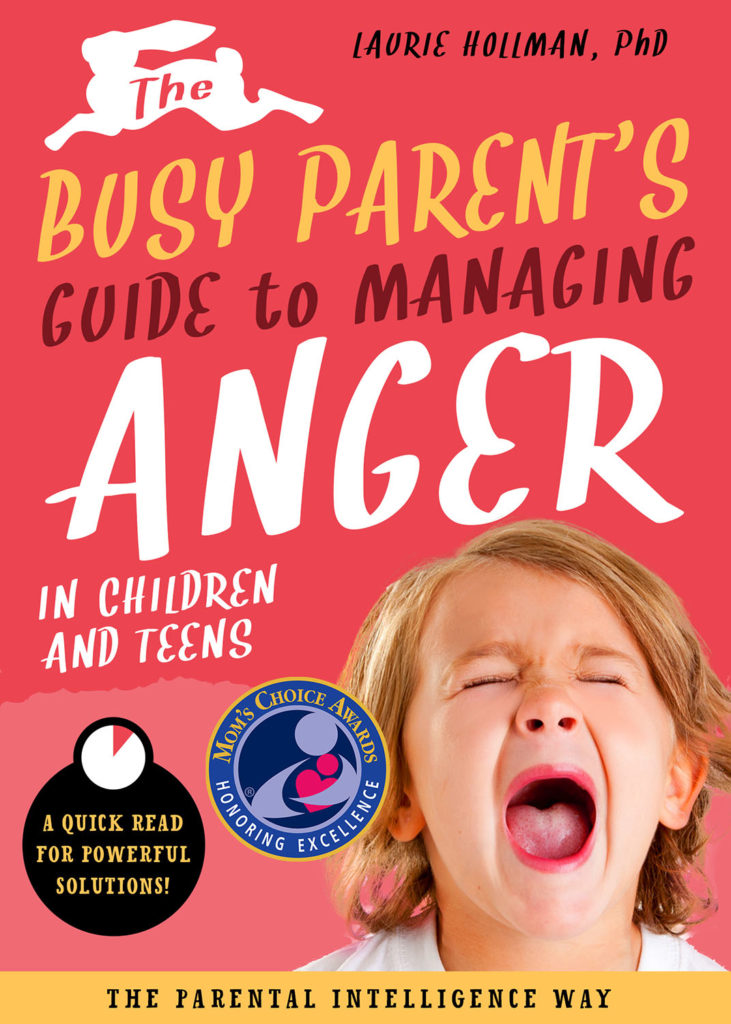The Busy Parent’s Guide to Managing Anger in Children and Teens – Excerpts
Introduction
“Do you wonder why your child feels edge, unduly angry, and restless at times—ormaybe all the time? Are you uncertain if and when you should be worried? Are you so busy that sometimes you dismiss these thoughts but later reconsider them? You may be noticing you have a frequently angry child or teen.”
Chapter One: The Parental Intelligence Way
“’What’s on your mind?’ is a question often asked casually, but central to knowing your child or teen. Understanding your child’s mind starts with knowing your child’s mental states and experiences: their intentions, thoughts, desires, beliefs, and feelings. Your ability to understand your child’s mind is directly related to your ability to self-reflect. As described above, self-reflecting is your capacity to think about your own experiences. When, with self-reflecting, you are able to understand how your own mind is working, you also realize your child’s mind is separate and autonomous from yours. However, if you do not understand this, you may unknowingly attribute your own mental states (intentions and feelings) to your child.”
Chapter Two: Healthy Expressions of Anger
“Angry feelings are natural for kids—and adults, for that matter—for all kinds of reasons. It’s healthy for parents to give the impression that emotions are normal and everyone has them. To do this early on, teach young kids feeling language, like happy, sad, mad, and glad. Then, as they grow older, give them the nuances of anger, such as irritated, frustrated, disappointed, annoyed, hurt, livid, heated, and enraged. This vocabulary is important if the child is to assess how angry they actually feel and why. Naming the emotions this way gives kids the opportunity to express themselves in words rather than physical actions when they are upset. It’s our job as parents with Parental Intelligence to listen carefully, without arguing your kids’ points at first, to really try and understand what is distressing them. If children and teens feel their parent is willing to step back and listen to their emotions, particularly anger, they can experience these feelings without being fearful of themselves for having angry feelings—or being fearful of their parents’ reactions while expressing them.”
Chapter Three: When Kids Say,”No”
“At least once a week, six-year-old Lee has trouble dealing with the normal authority of his parents. This has been going on for six months now. He frequently says “No” to his parents’ requests without provocation and, from their point of view, seems to be annoying them deliberately. In Lee’s mind, he says “No” to requests that are unreasonable, but even when his parents aren’t making requests of him, he is easily annoyed and often angry and resentful. He blames others for his mistakes or misbehavior. Rarely, but noticeably, he seems spiteful toward his mother in particular. This behavior only occurs at home. In his first-grade class, he is compliant with his teacher’s authority and, in fact, is doing well academically. He is learning how to read and write and enjoys his math and science lessons.”
Chapter Four: When Parents Say, “No”
“Tips for Parents Saying, “No” to Teens
- Notice if there is a pattern about what your teenager refuses to listen to when you say “No.” Maybe there’s a theme that has to do with the adolescent’s stage of development.
- Instead of arguing about the naysaying, try to open up a conversation about what bothers your teen about your saying ‘No.’
- Getting to know what’s on adolescents’ minds is difficult, especially when they are striving for independence and don’t seek advice. But reaching out is accepted more easily than you might imagine if it’s really clear that you’re nonjudgmental and know when to back off from sensitive topics.
- If it’s a topic like homework and academics, sometimes it’s important to have a discussion when homework isn’t being done. Like Ed’s dad, find a time when things are relatively laid-back and begin a discussion about future goals. Sometimes kids don’t really think much about their futures unless parents broach the topic. Teens are living in the present, making plans at the last minute, and finding their way in social circles, so discussing the point of homework itself doesn’t seem meaningful— just more school when they want a break. But if it’s discussed in the context of learning with the purpose of planning one’s career options, it may seem more important.
- If you give advice about when to do homework and say something like, “No videos before homework,” and your teen says, ‘I need a break now,’ listen carefully to him because he may have a good point, not just a means of defying your suggestion. (On the other hand, some kids are highly motivated and pressured to do extremely well academically with sights on exclusive colleges and difficult fields of study. These kids don’t need prompting for their homework; in fact, it’s sometimes helpful to support them in taking some time off from the demands they put on themselves. This is why it’s so essential to know your individual teen
- Be conscious of how often you say ‘No’ or set limits and whether it’s essential. For example, some reliable kids don’t need curfews. They find their own comfort in when their nighttime events should end. Other kids need the restrictions of curfews because they have trouble defining boundaries for themselves and even may silently like the limit setting. Again, know your individual teen.”
The Busy Parent’s Guide to Managing Anger in Children and Teens
